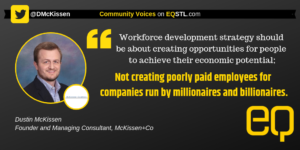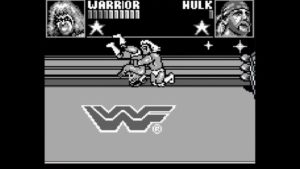
Why Entrepreneurial Communities Matter
Writer Dustin McKissen reflects on entrepreneurship across generations and the power of a entrepreneur's support network.
Writing by Dustin McKissen. Dustin McKissen is the founder of McKissen + Company, a public relations and strategy firm based in St. Charles, Missouri. He’s a two-time LinkedIn Top Voice on Management and Culture, and is a columnist for Inc., CNBC, VentureBeat and LinkedIn.
I know my dad doesn’t know this, but I have a yellowed and fraying 16-year-old business card that I keep in my “specials” box. That’s what my kids call the large box we keep in our basement that contains my childhood photo albums, the various pictures of me in my mullet era (which was far more prolonged than the average person’s mullet era), my prom photos, and the few pictures that show the way my mom looked when she was young, pretty, and thoroughly alive.
The business card says “MAC Product Handling”. It has an email address that doesn’t resemble a modern email address and the physical address of a law firm in a small town in Utah. The law office—my mom’s employer at the time—no longer exists. My mom, at least in a physical form, also no longer exists. She left the world last year.
MAC Product Handling no longer exists either. It went out of business about one year after subleasing an office from the law firm my mom worked for.
“MAC” was short for McKissen, and was a nickname my Grandpa had had throughout his life. He earned that nickname working in a rail yard. My dad always wanted to honor the nights his dad had spent maintaining Union Pacific track after having spent his days working on the farm they called home.
He thought the best way to honor that sacrifice was to bestow the MAC name on his new company.
What My Dad Didn’t Know
My dad spent my teenage years working for a manufacturing company in Salt Lake City, gaining very specific knowledge on a very complex process. He had done well for himself, and he’d done well for his family.
But he never really fit in.
He didn’t like having a boss. Down to the long hair and earrings he wore (and still wears), he was his own man. When he became too much of his own man he and his company parted ways, and my dad went into business for himself.
He knew his product. He knew his industry. He knew his market.
What he didn’t know was how to be his own billing department. Or marketer. Or IT director.
Like every other aspiring entrepreneur, my dad was a smart person who knew a lot of things, and didn’t know a lot of other things.
But what my dad didn’t have was even more important than what he didn’t know.
What My Dad Didn’t Have
Sixteen years ago, when my dad went into business for himself, he went in alone. He didn’t have what a lot of aspiring entrepreneurs, like his oldest son, take for granted.
My company, M5 Strategy + Branding, rents space at OPO Startups in St. Charles for less than $200 a month. Once a week, every Wednesday night, I hear presentations on how to market your new company, or how to implement best financial practices, or what new technologies may impact my industry. I hear from past, present, and future entrepreneurs. I am mentored by people who’ve succeeded and failed, and who help me conceptualize and understand my own successes and failures.
I hear a message that tells me I can succeed. I hear an equally important message that tells me if I don’t succeed it’s not the end of the world. Others have been there, and they dusted themselves off and kept on keeping on.
After the premature demise of MAC Product Handling, my dad never really dusted himself off.
He never heard that failing is not the same as being a failure.
I wish my dad had had what entrepreneurs in this community have with places like OPO Startups and T-REX. He thought of his own dad when he started his company, and I like to think that he’ll see me speak at the OPO one day. He’ll be in the back of the room, drinking a Schafly and eating some free pizza. His long hair will be tucked under his favorite American flag bandana.
And he’ll be proud, but he’ll wonder why his son didn’t think to name his company “MAC Branding + Strategy”.





